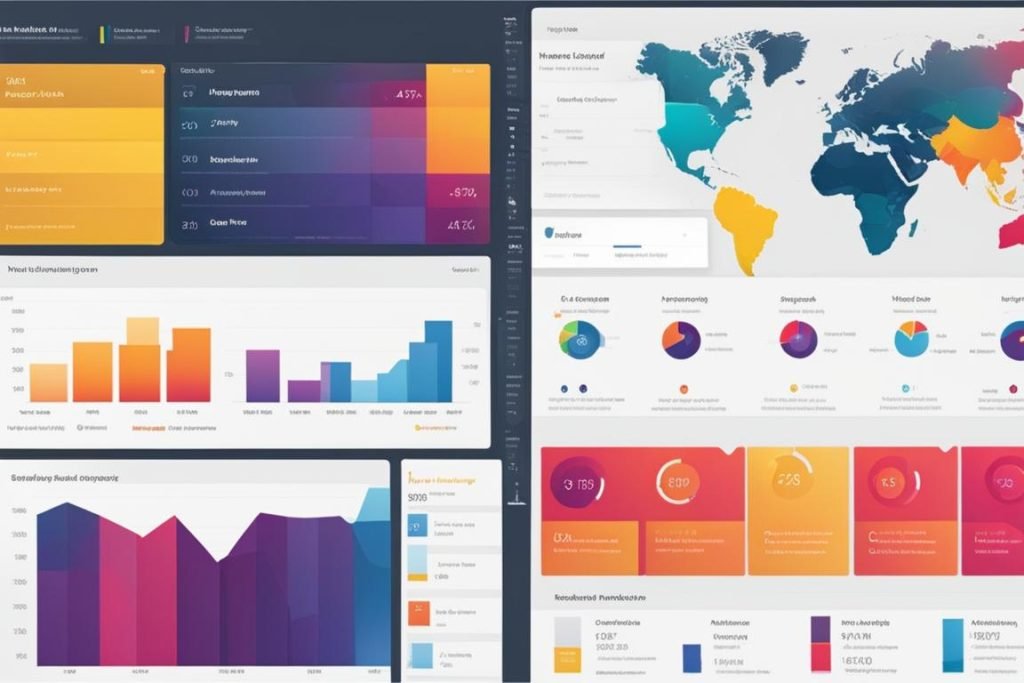In the fast-paced world of online business, having a strategic edge is crucial. We understand that digital marketers are the architects of this competitive advantage, wielding an array of potent digital marketing tools to sculpt an online presence that stands out. Our marketing strategy is the blueprint for success in the digital realm, meticulously drawn from the latest industry knowledge and technological expertise.
Our team comprises professionals with a solid academic grounding in marketing, enhanced by the comprehensive use of digital marketing tools that enable our clients to shine online. It’s not just about being seen—it’s about being memorable. We bridge the gap between businesses and their audiences, transforming clicks into lasting connections with the power of our digital proficiency.
Key Takeaways
- Adept understanding of digital marketing tools is vital for a prominent online presence.
- Professional education bolsters our approach to crafting superior marketing strategies.
- Our team’s expertise as digital marketers is key to maneuvering the digital landscape effectively.
- Employing industry experience, we tailor our marketing efforts to align with specific business objectives.
- We leverage marketing finesse to convert online visibility into tangible business growth.
- Continuous innovation and adaptation guide our strategies to meet the evolving demands of digital marketing.
The Importance of Formal Education in the Digital Marketing Industry
Within the dynamic realm of the Digital Marketing Industry, the pursuit of a Marketing Degree serves as more than just an academic achievement; it’s a cornerstone for building a prosperous career as a Professional Digital Marketer. We understand the pivotal role that formal education plays in equipping individuals with the essential theory and strategic frameworks necessary for steering through the industry’s complexities.
Our experiences have consistently shown us that the blend of comprehensive courseware and practical application forms the ideal launchpad. We have seen marketers with a solid academic background seamlessly integrate cutting-edge digital marketing tools into their practices, creating and leading campaigns that resonate with the target audience and deliver measurable results.
- Analytical and critical thinking skills refined through rigorous academic pursuits
- A fundamental understanding of consumer behavior and market research
- Strategic decision-making abilities honed by case studies and simulations
- Advanced communication and leadership capabilities, ideal for team collaboration and project management
When a marketer backs their hands-on tool expertise with a degree, they not only bring value to an organization but also set themselves apart as leaders adept at navigating the evolving landscape of online marketing. In our collaborative ventures, such well-rounded professionals have consistently delivered innovation and growth.
Rest assured, a Marketing Degree is not simply a testament to one’s dedication to the craft but a powerful tool that enhances every strategic move within the digital realm.
In essence, at the heart of every successful Digital Marketing Industry endeavor lies a well-educated, skillful strategist. Our goal is to continue fostering such talents, merging formal education with real-world experience to cultivate the next generation of masterful Professional Digital Marketers.
Core Skills Every Digital Marketer Should Master
As the digital world evolves, so do the benchmarks for successful marketing. We, as industry leaders, are at the forefront of mastering critical skills that set the standard for excellence. These core digital marketing skills encompass Search Engine Optimization, Content Marketing, and Social Media Marketing, each playing a pivotal role in forging a successful marketing strategy.
Search Engine Optimization Best Practices
Search Engine Optimization (SEO) is essential for increasing a website’s visibility and driving organic traffic. We focus on keywords, meta tags, and quality content to ensure that search engines favor our clients’ websites. This involves a meticulous process of on-page optimization, off-page linking strategies, and staying updated with Google’s algorithms. Our team’s expertise enables us to elevate a brand’s search engine rankings, making it more accessible to prospective customers.
Crafting a Compelling Content Marketing Strategy
Content Marketing is the art of storytelling that resonates with the target audience. It goes beyond creating content for content’s sake; it’s about delivering value, information, and solutions to our audience. We develop comprehensive content strategies that align with business objectives, engage customers, and prompt action. This strategy not only includes blog posts and articles but also multimedia content such as videos and infographics, driving both engagement and conversions.
Effective Social Media Marketing Techniques
Social Media Marketing involves more than just posting updates to company profiles. It’s about nurturing relationships, understanding audience behavior, and leveraging platforms for brand growth. Our approach includes a mix of organic outreach and paid advertising campaigns, ensuring increased brand awareness and fostering community around our clients’ brands. Through detailed analytics, we refine our strategies to better serve the audience and meet sales objectives.
Our commitment to excellence in these realms results in a harmonious blend of tactics that collectively enhance a brand’s digital footprint. By continually adapting to the latest trends and technological advancements within these core areas, we ensure our clients’ success in an ever-changing digital marketing landscape.
| SEO Component | Content Marketing Element | Social Media Focus |
|---|---|---|
| Keyword Optimization | Engaging Storytelling | Community Management |
| Link Building | Multimedia Content | Brand Voice Consistency |
| Mobile Responsiveness | Conversion-Driven Copy | Data-Driven Campaigns |
| User Experience (UX) | SEO Content Integration | Influencer Collaborations |
Mastering these core skills propels our digital marketing capabilities, ensuring that every strategy we implement is not only current but also predictive of future trends. By keeping these principles at the heart of our endeavors, we continue to deliver superior results for our clients and cement our standing as leaders in the digital marketing space.
Digital Marketing Tools and Platforms You Should Be Proficient In
As we navigate the vast ocean of digital marketing, proficiency in a set of core tools and platforms is essential for launching effective campaigns that resonate with audiences and drive business objectives. In this section, we’ll explore the software and systems that are crucial to the modern marketer’s arsenal.
Email Marketing Software & Automation
Personalization and efficiency are key when it comes to email marketing. Utilizing top-tier Email Marketing software such as Mailchimp, HubSpot, or Constant Contact empowers us to craft and automate targeted campaigns. These tools help us segment audiences, A/B test message effectiveness, and ultimately drive conversions through tailored communications.
Analytics and Data Analysis Tools
Having a command of Analytics is indispensable. Services like Google Analytics, Adobe Analytics, and IBM Watson provide profound insights into user behavior and campaign performance. With these tools, we decipher the digital footprints left by consumers, paving the way to optimize strategies and deliver data-driven results.
PPC Advertising Platforms
Efficient ad spend in PPC (Pay-Per-Click) Advertising relies on a deep understanding of platforms such as Google Ads and Microsoft Advertising. These platforms allow us to bid on keywords, tailor ads based on user intent, and track ROI with precision. The intelligent deployment of PPC strategies enables us to achieve maximum visibility and impact.
| Email Marketing Tools | Key Features | Analytics Platforms | User Insight Capabilities | PPC Platforms | Ad Customization Options |
|---|---|---|---|---|---|
| Mailchimp | Automation, Segmentation, A/B Testing | Google Analytics | Traffic Analysis, Conversion Tracking | Google Ads | Keyword Bidding, Performance Measurement |
| HubSpot | CRM Integration, Personalized Workflows | Adobe Analytics | Audience Segmentation, Real-Time Data | Microsoft Advertising | Audience Targeting, Ad Extensions |
| Constant Contact | Email Templates, Contact Management | IBM Watson | Behavioral Analytics, Predictive Analysis | Facebook Ads Manager | Demographic Targeting, Lookalike Audiences |
Mastering these digital Marketing Automation tools equips us with the means to elevate our digital strategies, ensuring compelling and personalized customer journeys from start to finish. As we progress in our marketing endeavors, these platforms will continue to be invaluable assets in our quest to achieve excellence.
Integrating Traditional Marketing Concepts with Modern Digital Strategies
As we navigate the ever-evolving landscape of marketing, one constant remains clear—traditional marketing concepts still hold valuable insights that can amplify our digital strategies. By merging classic techniques with contemporary methods, we not only honor the past but also innovate for the future. Hence, integrated marketing becomes not just a concept but a practical approach that guides us in creating campaigns that resonate across generations and technological preferences.
Understanding the psychology behind consumer behavior and the art of persuasive messaging is a legacy of traditional marketing that is as relevant today as it ever was. The goal remains to create a seamless consumer journey, with digital touchpoints enhanced by the timeless principles of trust, credibility, and emotional connection. Here’s how we achieve this blend:
- Align core messages across all channels for cohesive brand storytelling.
- Use print’s tangibility to reinforce online calls-to-action.
- Combine the broad reach of television and radio with the targeted precision of online ads.
- Employ outdoor advertising to drive traffic to digital experiences.
Furthermore, we see the practical integration of these philosophies mirrored in our day-to-day marketing efforts:
| Traditional Marketing Aspect | Integration with Digital Strategies |
|---|---|
| Consumer Segmentation | Targeted advertising using digital demographics and behavior profiles |
| Direct Mail | Email marketing campaigns with personalized content |
| Physical Promotions (Coupons, Flyers) | Digital coupon codes and e-flyers with QR codes |
| Word-of-Mouth Referrals | Online reviews and social media advocacy programs |
| Networking Events | Webinars and live-streamed interactive sessions |
The dynamics of traditional marketing create tangible experiences that digital marketing can sometimes overlook. It’s in the intersection of these disciplines that we find a richer, more authentic connection with our audiences. By applying these age-old practices in concert with digital efficiencies, we create a marketing symphony that appeals to both the modernist and the traditionalist, each complementing the other to form a holistic strategy.
Understanding and Implementing Conversion Rate Optimization
When we talk about the lifeline of digital marketing strategy, it invariably comes down to one quintessential goal: enhancing online conversion. At the core of this objective lies the mastery of Conversion Rate Optimization (CRO), a technique which directly influences the profitability and success of online businesses. By focusing on CRO, we fine-tune every touchpoint a visitor has with your brand to ensure that each step in their journey is leading them closer to becoming a customer.
Step-By-Step Analysis: Our process begins with a meticulous analysis of the current online experience your customers encounter. We leverage various data points to understand where users are dropping off and identify the factors that can turn them into loyal customers.
- Analyze click-through rates (CTR) to uncover the effectiveness of call-to-action (CTA) elements
- Investigate navigation patterns to streamline the path to conversion
- Conduct A/B testing to determine which page layouts yield better conversion rates
Refinement of User Experience: The data gathered paves the way for targeted enhancements in the user experience. We scrutinize every component, from webpage loading times to the visibility of key information, ensuring each element contributes to a seamless online conversion path.
User-Centered Content: Content is king, but context is the kingdom. We create content that speaks directly to your users’ needs and desires, which means having a dynamic digital marketing strategy that aligns with user intent, boosting conversions through relevant and persuasive messaging.
Continuous Optimization: CRO isn’t a one-time project; it’s an ongoing commitment to excellence. Our approach incorporates continuous testing and learning to ensure that your digital marketing strategy evolves with the changing behaviors and preferences of your audience.
To illustrate the gravity of Conversion Rate Optimization in a digital marketing strategy, consider the following scenario:
We recently worked with an e-commerce client whose site had significant traffic yet suffered from a low online conversion rate. By implementing a rigorous CRO plan that focused on simplifying checkout processes and clarifying product benefits, we unlocked a significant uptick in sales, illustrating the direct impact of CRO strategies on the bottom line.
Indeed, Conversion Rate Optimization is not just a tactic but an essential component of any robust digital marketing strategy, pivotal in maximizing the return on investment. It’s a harmonious blend of art and science where data, creativity, and strategy converge to turn visitors into valued customers.
Expanding Your Skill Set Beyond the Degree: Continuous Learning in Digital Marketing

In our industry, we recognize that earning a degree is the launchpad—not the final destination—of a digital marketer’s education. The metaphorical mortarboard cap must be thrown into a sky that represents the vastness of continuous learning. It’s the fuel that propels us forward in the dynamic realm of online advertising.
As we steer through an ocean of digital trends, it’s imperative to keep our sails adjusted to the latest currents of change. This dedication to perpetual growth is what sets apart proactive marketers from the passive. Today, we’ll dissect precisely why—and how—continuous professional evolution plays a pivotal role in our careers.
Keeping Up with the Ever-evolving Online Advertising Landscape
Stagnancy is the arch-nemesis of innovation. To thrive within the online advertising sector, one must adopt a student’s mindset throughout their career. New platforms emerge, algorithms get updated, and consumer behaviors shift; being attuned to these changes is necessary. Whether it’s mastering the newest features of an advertising platform or dissecting case studies on emerging marketing strategies, we are committed to ensuring our skill set is ever-expansive and relevant to the demands of the market.
The Role of Networking and Professional Development
The adage ‘It’s not just what you know, but who you know’ manifests its truth starkly in the realm of digital marketing. Networking forms the backbone of our profession, paving avenues for collaborations, mentorship, and growth opportunities. Engaging with peers, attending industry conferences, and participating in workshops are just the tip of the iceberg. This integration of professional development activities fosters a supportive community from which we can both contribute to and draw knowledge. Together, we can rise by lifting others—leveraging collective expertise for individual and communal advancement.
In conclusion, we embrace continuous learning with open arms, knowing it’s an indispensable part of our journey in digital marketing. It’s this commitment to evolution, alongside meaningful networks, that advances not just our careers, but also the success stories of the businesses we champion.
Impact of a Strong Marketing Strategy on Business Success
Understanding the impact of online marketing on the growth of a business is critical in today’s digital-first landscape. A well-thought-out marketing strategy is not just a facet of the business plan—it’s the engine that propels a brand towards market dominance and business success. We’ve seen firsthand how strategic planning transforms potential into performance, and it is through this lens that we explore the importance of a comprehensive marketing approach.
At the heart of a successful campaign is the alignment with a company’s core goals. A strategy that speaks to the brand’s vision while flexibly accommodating market shifts will not only engage but captivate the target audience. It’s precisely this ethos that enables online marketing to resonate and achieve substantial brand impact. From increasing sales to establishing a strong, loyal customer base—effective marketing is the differentiator.
With strategic online marketing, every campaign is an opportunity to advance the narrative of the brand and carve out a unique space in the consumer’s mind. Tailored content, intuitive social media interaction, and optimized digital advertising are just pieces of a comprehensive puzzle driving brand growth. We aim to craft narratives that not only inform but inspire action, underpining the intrinsic value of a stellar marketing strategy.
| Critical Component | Benefit to Business |
|---|---|
| Brand Awareness | A broader reach and recognition in the marketplace. |
| Customer Engagement | Higher interaction rates leading to increased loyalty. |
| Sales Conversion | Streamlined pathways from browsing to purchasing. |
| Customer Retention | Creating lasting relationships with repeat customers. |
| Data-Driven Insights | Enhanced decision-making capabilities through analyzed customer data. |
The influence of online marketing impact on the trajectory of a company cannot be overstated. As architects of digital influence, we bring an analytic and creative spirit that blends seamlessly with the technological advancements shaping the online experience. Embracing this dynamic is what positions companies ahead of the curve and at the pinnacle of their market.
In closing, a strong marketing strategy is integral, acting as the steering wheel guiding businesses through the competitive terrain of the digital age. Crafting this strategy with precision and adaptability ensures not just survival but thriving success in a world increasingly dependent on online engagement.
Leveraging Analytics to Inform Your Marketing Decisions

In today’s digital age, analytics serve as the compass guiding marketing strategies across industries. By harnessing the power of data, we extract valuable insights into User Behavior and Traffic Sources, which are instrumental in crafting informed Marketing Decisions. A deep dive into analytics not only clarifies the user’s journey but also pinpoints the efficacy of various engagement channels—from social media to organic search—transforming data points into actionable intelligence.
Interpreting User Behavior and Traffic Sources
Interpretation of User Behavior offers a window into the preferences and pain points of our target audience. With tools like Google Analytics, we monitor key metrics including page views, session duration, and bounce rates to understand how users interact with our content and online platforms. Similarly, analyzing Traffic Sources enables us to identify which channels—whether it be direct traffic, referrals, search engines, or social networks—are most effective in driving visitors to our sites, thus informing our channel-specific strategies and budget allocations.
Adjusting Campaigns Based on Performance Metrics
Analytics go beyond mere observation; they empower us to make timely adjustments for optimizing Campaign Performance. Metrics such as conversion rates, click-through rates, and cost per acquisition serve as benchmarks that drive our campaign evolution. By analyzing these performance indicators, we refine targeting, messaging, and creative elements, aligning them with the audience’s expectations and the campaign’s objectives. This continuous loop of analysis and adjustment is fundamental to achieving an attractive return on investment and ensuring that our marketing endeavors are not just creative, but also efficient and effective.
Career Paths and Opportunities for a Digital Marketer
As digital marketers, we inhabit a world brimming with marketing opportunities that fuel our professional growth. Our expertise allows us to cultivate a Digital Marketer Career with an array of pathways, each offering a distinct blend of challenges and rewards tailored to our individual skills and passions. From specialized roles in SEO and content marketing to broader positions like brand management or digital strategy, we have the power to shape our professional destinies.
The rise of digital media has given birth to various roles that didn’t exist a few decades ago, creating fresh streams of endeavor and enterprise. Let’s look at a table that illustrates some of the most common and exciting career paths available to digital marketers today:
| Career Path | Scope of Role | Expected Skills | Potential for Growth |
|---|---|---|---|
| SEO Specialist | Enhancing website visibility and organic traffic | SEO, Keyword Research, Analytics | High |
| Content Marketing Strategist | Developing and managing content to engage target audiences | Content Creation, Content Management Systems, Storytelling | Moderate |
| Social Media Manager | Building and maintaining a brand’s presence on social media | Social Media Platforms, Engagement Strategies, Copywriting | Variable |
| PPC Analyst | Optimizing paid advertising campaigns for maximum ROI | Ad Platforms, Bid Management, Data Analysis | High |
| Digital Brand Manager | Overseeing a brand’s online presence and performance | Branding, Digital Media, Cross-Channel Marketing | High |
| Email Marketing Specialist | Executing email marketing strategies to nurture leads and maintain customer loyalty | Email Automation, List Management, Segmentation | Moderate |
| Data Analyst | Interpreting data to inform better marketing decisions | Data Collection, Reporting, Insight Synthesis | High |
Our career is not a static construct but an evolving journey that rewards the curious and the adaptable. The digital landscape continues to morph, and with it, the marketing opportunities that come our way. As we leverage our varied talents and remain open to continuous learning and innovation, our paths weave through the digital ecosystem, leading us to newer heights of professional growth and success. We embrace the multitude of directions our Digital Marketer Career can take, knowing that the only constant in our industry is change, and with it comes endless possibility.
Our online marketing journey is a testament to the power of integration—melding the tried-and-true principles of traditional marketing with the dynamism of modern strategies. This comprehensive approach anchors our efforts, giving us the versatility to navigate various market climates and consumer preferences. It’s this strategic synthesis that transforms businesses, catalyzing growth and fostering enduring connections with audiences.
In closing, our collective endeavor for digital marketing success is ongoing, a blend of education, hands-on tool mastery, and a commitment to perpetual learning. By embracing this multifaceted progression, we champion the digital marketing industry, constantly refining our skill set for the zenith of professional achievement. We strive, we adapt, and we conquer, all in the name of propelling businesses to their pinnacle of potential.
FAQ
Why is a degree in marketing important for a digital marketer?
A degree in marketing provides a solid theoretical foundation and strategic understanding crucial for navigating the dynamic digital marketing industry. It equips professionals with a comprehensive understanding of consumer behavior, marketing principles, and business strategies which are essential when applying digital marketing tools to achieve successful outcomes for businesses.
What core skills should every digital marketer master?
Digital marketers should have a firm grasp of Search Engine Optimization (SEO) best practices, content marketing strategy, and social media marketing techniques. Mastery of these skills increases a brand’s online visibility, engages and converts audiences, and maintains a strong presence across social platforms, forming the cornerstone of a successful marketing strategy.
Which digital marketing tools and platforms should marketers be proficient in?
Digital marketers should be proficient in email marketing software and automation tools to personalize the customer journey, analytics and data analysis tools to gain insights into user behavior, and PPC advertising platforms to manage ad spend efficiently. These tools help in executing targeted and effective marketing campaigns.
How can traditional marketing concepts be integrated with modern digital strategies?
Traditional marketing concepts can be integrated with digital strategies by adapting timeless principles, such as the 4 Ps (Product, Price, Place, Promotion), to the digital landscape. Utilizing them to guide content creation, online engagement, and digital campaigns can help resonate with a diverse demographic and create a comprehensive marketing approach.
What is Conversion Rate Optimization and why is it important?
Conversion Rate Optimization (CRO) involves increasing the percentage of visitors to a website who take desired actions, such as making a purchase or signing up for a newsletter. CRO is crucial as it helps businesses maximize the value of their traffic, enhance user experience, and improve the performance of their marketing efforts leading to increased revenue.
Why is continuous learning important in the digital marketing field?
The digital marketing industry is fast-evolving, with new trends, platforms, and technologies emerging regularly. Continuous learning ensures that digital marketers stay updated with these changes, allowing them to adapt their strategies and maintain a competitive edge. Additionally, networking and professional development support career advancement within the industry.
How does a strong marketing strategy impact business success?
A strong marketing strategy aligns with a business’s goals and market conditions to effectively target the right audience. It is essential for driving brand growth, increasing sales, and building a loyal customer base. Strategic online marketing has direct implications for business success, as it influences consumer perceptions and buying behaviors.
How can analytics inform marketing decisions?
Analytics provide detailed insights into user behavior, traffic sources, and campaign performance, which inform marketing decisions and strategies. By interpreting this data, marketers can adjust campaigns to better meet objectives, improve engagement, and ensure a better return on investment for their marketing efforts.
What career paths are available for digital marketers?
Career paths for digital marketers are diverse, ranging from specialized roles like SEO expert or content strategist to broader positions such as brand manager or digital marketing director. Opportunities for growth are vast, and professionals can choose to hone their expertise in specific domains or take on roles that oversee various aspects of digital marketing.





